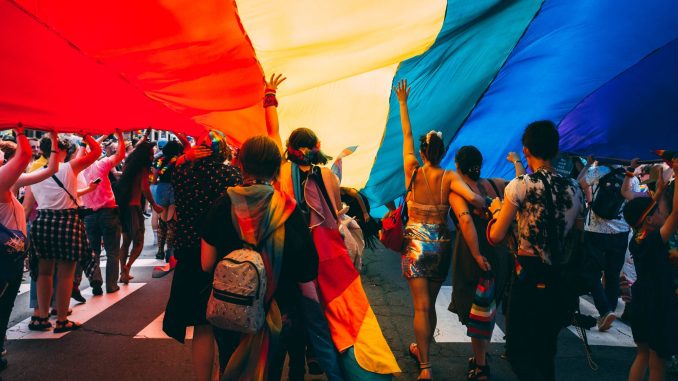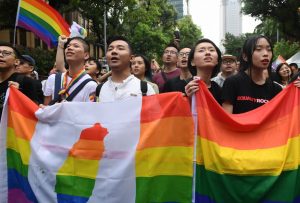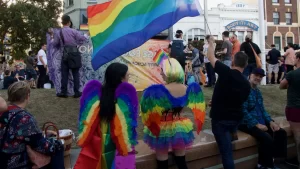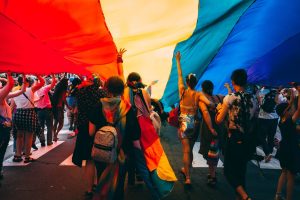
It was a sunny afternoon when I first saw them. We made an appointment to take pictures together. On that day, as a photographer, I was going to take pictures of them and their child. Their child is an adorable Shiba Inu. I interviewed them during the break.

⬆️ My first meeting with the interviewee
⬆️ The interview with a gay couple in Australia
They are a gay couple living in Australia for over six years. They are from China. They met in Sydney in early 2017. They have similar ages and hobbies and come from the same city in China. They are now in a de facto relationship and plan to officially get married next year. They have bought a house together in Sydney, have two cars, have two dogs, go to work together, get off work together, and walk the dog together every day. They have long passed the period of passionate love, and like many heterosexual couples, they lead an ordinary life in Sydney. The ordinary day after day does not mean that they are tired of each other, but they are closer and more loving. Fortunately, Australia now has such an environment and legal system that allow them to live normally like heterosexual couples.
⬆️ The interview with a gay couple in China
I also interviewed a gay couple who are currently in China. They have been together for two years. It is said that this is a relatively long-term and stable relationship among young gay groups in China. Their life together is romantic and interesting. But in China, gay marriage is not yet legal, and it is estimated that there is still a long way to go before it becomes legal. He said that he had fantasized about getting married to a same-sex couple more than once, and every time he went to someone else’s wedding, he was very envious, so he was very much looking forward to the legalization of same-sex marriage in China. If he had the chance to get married in a country where same-sex marriage was legal, he would go there. However, the Chinese have a strong sense of family and cannot do without their existing family. Considering the economic cost, it may be difficult to marry in a foreign country for the time being. But if given the chance, he would go for it without hesitation.

Compared to China, where same-sex marriage is still illegal, Australia has made significant progress in this area. However, the path to legalizing same-sex marriage in Australia has not been without its challenges.The journey towards legalizing gay marriage in Australia encompassed a series of legal and societal developments.

Early Advocacy: Beginning in the 1980s, activists and organizations in Australia championed marriage equality, fighting for equal rights for the LGBT community, including the right to marry.
Legal Recognition: In 2004, the Australian federal government introduced the Marriage Amendment Act, which defined marriage explicitly as a union between a man and a woman. This amendment reinforced the existing definition, effectively prohibiting same-sex marriages.
The Ruddock Inquiry: In 2017, the Australian government conducted the Ruddock Inquiry, a postal survey to gauge public opinion on same-sex marriage. The majority of respondents expressed support for marriage equality.
Marriage Amendment (Definition and Religious Freedoms) Act 2017: Building upon the survey results, the Australian Parliament passed the Marriage Amendment Act in December 2017. This legislation legalized same-sex marriage nationwide, granting recognition to LGBT couples and their unions under Australian law.
Implementation and Celebrations: On January 9, 2018, the first same-sex marriages were celebrated, following a mandatory one-month notice period. The legalization of gay marriage was met with widespread jubilation and garnered significant support from the Australian public.
WATCH: Same-sex marriage bill passes@ABC News (Australia)
It’s important to note that the path to marriage equality in Australia encountered considerable debate and opposition from conservative groups and politicians. However, the determination of activists, widespread public support, and evolving societal attitudes ultimately led to the historic moment of legalizing same-sex marriage in the country.
Australia has not only legalized same-sex marriage but also established numerous activities and initiatives to support gender diversity and foster inclusivity.
The country hosts vibrant pride parades and festivals nationwide, such as the renowned Sydney Gay Carnival. The 2023 Mardi Gras parade in Sydney, which recently took place, stood out as the largest gay carnival in the southern hemisphere in recent years. Following the pandemic, people finally had the opportunity to hold a grand festival parade. Other Australian cities also organize pride parades and festivals, including the Melbourne Pride Parade, Brisbane Pride Festival, and Adelaide Feast.
WATCH: ABC News interview on the 2023 Mardi Gras Parade @ABC News (Australia)
In Australia, medical services for the LGBT community cater to their specific needs through a range of specialized care. Gender-affirming healthcare, including hormone replacement therapy and gender-affirming surgeries, is readily available. Accessible mental health support services address the unique challenges faced by individuals, such as coming out, discrimination, and overall mental well-being. Sexual health clinics offer comprehensive services tailored to the LGBT community, including HIV testing, STI screenings, and sexual health education. Healthcare providers are increasingly trained in cultural competency to provide sensitive and inclusive care. However, despite advancements, access to these services can still vary, and ongoing efforts are being made to address disparities and ensure equitable healthcare for all members of the LGBT community.
Furthermore, various organizations in Australia actively contribute to supporting gender diversity and providing valuable resources for individuals and communities. Prominent examples include Minus18, Transgender Victoria, A Gender Agenda, and Open Doors Youth Service.
In addition, many educational institutions and community organizations in Australia organize workshops, seminars, and awareness campaigns to promote understanding and inclusion of gender diversity. These initiatives aim to foster acceptance and combat discrimination.

Australia remains committed to promoting inclusion and equal rights for all, regardless of gender identity. While discrimination and conservative opposition persist, ongoing efforts are needed to ensure full equality and social acceptance. But the country has made significant strides towards building an inclusive society and is at the forefront of the world.


Be the first to comment